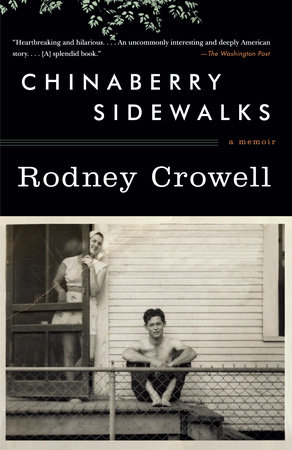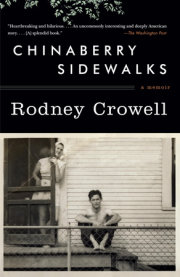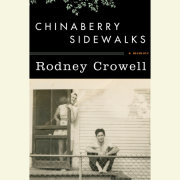Chapter 1
New Year's Eve, 1955
The four beer-blitzed couples dancing in the cramped living room of my parents' shotgun duplex were wearing on my nerves. In particular, I didn't like the sound of their singing along with my prized Hank Williams 78s. Coon hunting with my grandfather, I'd heard bluetick hounds howl with more intonation than this nasal pack of yahoos. For a while I tried contenting myself with sticking my fingers in my ears and staring squinty-eyed at the scuff-mark patterns forming on the linoleum, hoping a likeness of Jesus or Eisenhower-the only famous images I knew of at the time other than "ole Hank," as my father and I referred to our favorite singer-would stare up at me from beneath the dancers' feet. But when all I could summon up was a swarm of black stubby snakes, I gave up and went back to being in a funk.
The next thing I remember, Cookie Chastain was screeching to be heard above the scratchiness of whichever record she'd just gored with the blunt end of the phonograph needle. "Twenty minutes till midnight. Everybody change partners." And while the rest of the gang bumped around and groped for whom to dance with next, she was making a big deal out of sashaying into the waiting arms of the one man whose lust for oblivion I knew could turn this little shindig into a repeat of my worst nightmare. By then I'd guzzled most of the six-pack of Cokes I'd discovered in the icebox and was no longer ready to pretend that this New Year's Eve nonsense was anything but a recipe for disaster. My mother was mad as a hornet, but too ashamed to make a scene just yet; Mr. Chastain and the others were too wasted to notice or care; and my father, the only real singer in the bunch, had once again lowered his standards to a level that guaranteed trouble.
I'd been privy to the shadowy undercurrents detailed in my mother and father's all-night shouting matches long enough to know that drunk husbands and wives swapping two-steps with other drunk wives and husbands, though a time-honored Texas tradition, was anything but harmless fun. I could never grasp what she accused him of doing with Lila May Strickland or Pauline Odell, but I knew by her disdain for the word "screwing" that nothing good ever came of the deed. And it got more complicated when she started screaming about how he'd even screw a light socket if one could spread its legs for him. Grown-ups were weird.
Unlike my father, I was beginning to understand that all this business about who or what he was supposedly screwing served a darker purpose for my mother: setting up yet another reprise of the brain-scalding accusation that he'd belt-whipped her across the belly when, eight months pregnant with me, she stood naked in the bathtub.
The scene is seared in my mind as if I'd actually been able to witness it. A sliver of July dusk creeps in under the canvas window shade, and the dangling circle on the end of its pull string is tapping against the yellowed wallpaper beneath the sill. On the back of the door, an ancient hot-water bottle gives off traces of vinegar douche, mementos from a time before I entered the picture. There's the buck-stitched cowboy belt and fake trophy buckle; for years I imagined a silver- headed rattlesnake in the grip of an escaped convict, though I've yet to conjure how he managed, in a space half the size of a prison cell, to wield the thing. And veiled in a sepia gauze, courtesy of the light fixture above the medicine cabinet, is my mother, naked as Eve, dripping wet and cowering in the claw-footed tub, stillbirth emblazoned across her frontal lobe. But whose memory is this in which I can see these things so clearly yet can't place my father? His? Hers? Or mine?
I despised my mother's need to belittle my father in my eyes as much as I hated his refusal to deny wielding this belt. To accept her version as fact, which I did, and never believing his trademark "Aw, hell, Cauzette, you know I did no such a thing" meant embracing the possibility that it could all happen again. Together, my parents made it impossible to keep my father on the pedestal where I needed him most. And about that, all I can tell you is this: I'd be well within range of the truth if I said there were times I was mad enough to kill them both.
I'd been sleeping in the living room longer than I could remember, my mother making a nightly ritual of "fixin' [me] up a pallet" on the sofa. In the early days, the kitchen chair she positioned to keep me from rolling off onto the floor simulated a perfectly good crib. Still, the shame of my not having a bedroom of my own was particularly hard on her. Other than dying and going to heaven, the dream of a nursery for her only living child was her lone investment in the promise of a better future. As far as I was concerned, this was a waste of wishful thinking; I much preferred my arrangement on the couch to the mildewed cave that was the front bedroom.
Conditions surrounding my parents' beer-and-baloney soiree made the crossing of some invisible line in their ongoing war of hard words and physical abuse a foregone conclusion. As much as I hated the discomfort of having my territory invaded by mindless adults, I dreaded even more my inability to escape the hellish crescendo I knew would follow when my father started chasing beer with whiskey.
But no refuge was to be found in the front bedroom, whose dark shadows and damp spookiness scared me witless. Wallpaper hung from the ceiling in stained ragged strands, like a cross between witch hair and brown cotton candy. The jaundiced glow of the exposed overhead lightbulb fell far short of its four corners, where untold evil lurked. Should I find myself alone in that room, the cardboard windowpanes, creaky floors, and lumpy thirty-year-old mattress were the least of my worries.
Traffic to and from the party's beer supply rendered the kitchen in back of the house a useless hideout, likewise the bathroom where I could have played with my toy cars on the floor. Left to idle in the narrow hallway between the living room and the bedroom, I began to hatch a plan.
My intention to break up the party, before it reached the point that my parents had time and again proven themselves unable to return from without inflicting damage, didn't necessarily include subjecting their guests to bodily harm. I liked Doc and Dorothy Lawrence, Pete and Wanda Faye Conn, Paul and Cookie Chastain as sober adults. Just the same, the job of saving my parents from themselves called for drastic measures, and innocent bystanders couldn't be helped.
My father kept a loaded pump-action 16-gauge and a .22-caliber rifle stashed in the bedroom closet. Such an arrangement was as natural to him as breathing the night air. Childhood in the Depression-era backwoods of western Kentucky had left him ingrained with the notion- contrary to his wife's-that a boy was never too young to put food on the table. On the morning of my fifth birthday, I awoke to find him cleaning the shotgun. While examining his handiwork, he broached the subject for the first time. "Son," he said, affecting more profundity than I was used to hearing, "in this old world of snakebites and hunger pain, a man's aim's 'bout as close as he's gonna get to a paid- up insurance policy. They ain't many scores that cain't be settled with a load of buckshot." My mother argued rather convincingly that in East Houston in the midfifties, squirrel and rabbit were in such short supply that knowledge of small firearms was about as useful as the ability to speak Portuguese. But she was told where she could stick Portuguese, and with that the discussion ended. Later in the day, he borrowed Little Willie Smith's shiny black '49 Ford Roadster and drove Grandpa Willoughby and me to a pine thicket north of Old Wallisville Road, where I was given my first lesson with a single-shot .22.
My decision to fish the .22 from the closet wasn't made lightly. To retrieve the gun meant entering the room alone, a chilling prospect even in broad daylight. But sensing the storm gathering behind the rising levels of alcohol, I figured those dark corners were no match for what would happen if the adults out there started screwing each other.
Aside from enhancing the gravity of my announcement that it was time to go home, I had no intention of using the gun. Based loosely on the Saturday matinees I'd seen at the Navaway Theater, where the good guy got the bad guy's attention by wielding a six-shooter full of silver bullets, my plan required the gun as a prop.
Hank Williams was singing "Lovesick Blues" when I stepped into the living room armed with my father's rifle. Dorothy Lawrence was the first to notice my arrival. "My Lord, he's got a gun!" she called out, a bit less dramatically than I'd have liked but compelling nonetheless. The focus of attention shifted instantly in my direction, and having all eyes on me sent a surge of power through my nervous system that left my mind a small blank canvas. From there, the script unraveled.
It was lack of preparation for this pivotal moment that provoked two serious blunders: one, inadvertently disengaging the thumb-activated safety on the rifle; two, pointing it at my father and pulling the trigger. The bullet exploded into the linoleum floor less than a foot from where Dorothy stood. "Lovesick Blues" came to a screeching halt, and my father pounced on me like he was Batman on pep pills. Sensing his first impulse was to beat me with the butt of the rifle, I braced myself for the worst. Instead, he hugged me so close to his heart that even through the ringing in my ears I could hear it pounding. Being squeezed so hard that I could barely breathe gave me a feeling of comfort. My peacekeeping mission was complete. There would be no fighting that night.
Shocking people sober and sending them home thankful to be alive is one way to break up a party. Although visibly shaken, my parents' friends showed no ill feelings. Cookie Chastain said she knew I was "a good boy and wouldn't hurt a flea." Pete Conn reckoned I "knew not to play with no more loaded guns." Doc Lawrence went as far as making a joke about my aim being so bad that I was "lucky not to have shot [my] dang pecker off." Hushed exits, however, told the story of how they really felt.
My parents never asked why I chose to wave a loaded rifle around a room full of people, let alone pull the trigger. Their joint lecture on involuntary manslaughter suggested they were filing the experience away under the harmless "Child Plays with Father's Gun" heading. I wanted to tell them my true intentions, that it was all their fault, that I was sick of being stuck in the middle of their stupid shouting matches, that their friends needed singing lessons. Seeing them work as a team held this impulse in check. At that moment, volunteering information seemed as great a waste of ammunition as the .22 slug lodged in the floorboards.
On the surface, a temporary halt in my parents' conflict and a hole in the linoleum was all I had to show for my shooting spree. Beneath that, my success was more far-reaching. Ten-plus years of knock-down- drag-outs were still to be accounted for, but from that day on my father refused to allow a loaded gun in the house, a decision that perhaps saved his life and my mother's many times over.
Copyright © 2011 by Rodney Crowell. All rights reserved. No part of this excerpt may be reproduced or reprinted without permission in writing from the publisher.





